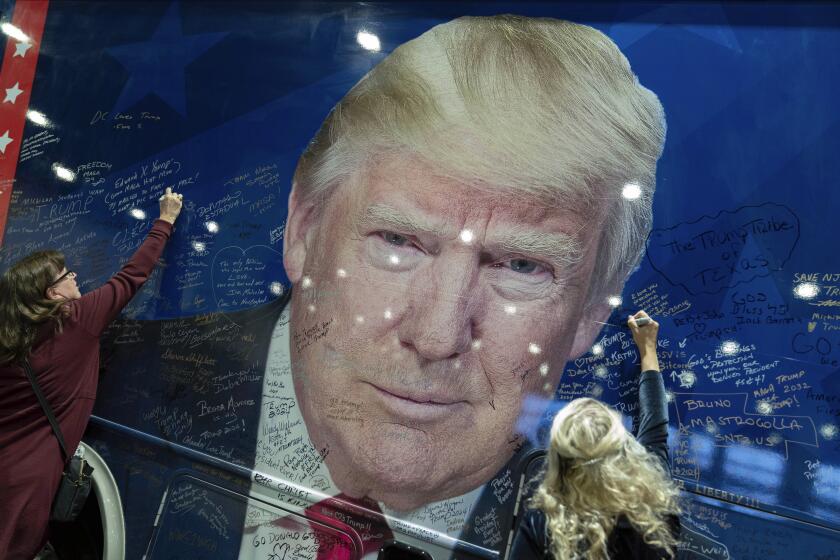Every year I ask my political science students, “What is your earliest political memory?”
I ask these questions to find out what political and cultural moments shaped them. Over the years, their answers have primarily helped me think about the mix of perspectives in my classroom. But recently, my students’ answers have caused me to rethink contemporary American politics.
Why? Because most of my students can’t remember politics without Donald Trump at its center. Few remember Barack Obama’s second inauguration in 2012, and only vaguely.
This has significant implications for their political identity and that of the nation.
Read more: Opinion: For those who don’t vote: Will this postcard get you to the polls?
Most college students today are between 18 and 22 years old, so they were between 9 and 13 when Trump burst onto the political scene in 2015. They came of age in the Trump era and think about politics in a very different way than we do.
Both parties are aggressively courting Gen Z voters, which could have a dramatic impact on the next election — and shift the mindset of older voters, too.
The big difference between the age groups is that these younger voters knew very little about the pre-MAGA Republican Party. To us older folks, Trump still feels like an outcast, an anomaly who has hijacked the “real” Republican Party and remade it in his own image.
Read more: Opinion: The forces behind Trump that we’re not talking about yet
For example, many MAGA-hating “Never Trumpers” can continue to call themselves Republicans. Organizations like the Lincoln Project, websites like the Dispatch, and politicians like former Congressmen Liz Cheney and Adam Kinzinger offer some of the most articulate and uncompromising anti-Trump views. Most of these claims come from people of a certain age who still identify as Republicans at heart.
But for younger voters, the idea of a different type of Republican may feel like historical fiction: It feels as far removed from them as the Whigs or the Federalists, a story that took place in an America long ago.
Even my students, who are traditionally Republican and conservative in their thinking, struggle to think of themselves as Republicans; they prefer to be known as Independents, Libertarians, or Democrats.
Self-described Republicans are doing so because of Trump, and as polls have repeatedly shown, young people who support the former president are also overwhelmingly male.
This shift in perception is one reason why the GOP’s departure from MAGA may be harder than many Never-Trumpers hope: Even if Trump ultimately rides that golden escalator to the afterlife out of politics, he will have redefined the term “Republican” for a generation in ways that will be difficult to reverse.
My students have also changed the way I view the Democratic Party. Those of us with pre-MAGA memories might compare the vibe and memes of Harris-Waltz to the energy of President Obama’s first presidential campaign. But most of today’s college-age voters were just toddlers when Obama began promising “change you can believe in.”
To them, the Harris-Waltz campaign’s strength is more than an echo of previous campaigns. It’s an entirely new way of thinking about politics, a revelation that elections are about possibilities. To them, this atmosphere is different. And it’s big.
Many college-age voters are experiencing, for the first time, the joy and excitement that comes from joining with others and committing to a shared vision of a better world. That feeling isn’t going away. It’s a huge driver of participation and action, and it’s showing up not only on TikTok but also in our voter registration numbers.
So when people my age say that the good vibes around Kamala Harris won’t last until the election, I acknowledge that for people my age, that may be true.
But for this election’s youngest voters, this mood may actually represent a deeper, more powerful generational shift — and I’m not sure that this mood will dissipate before or even after this election.
Gen Z voters barely remember anything pre-Trump, and in the near future, it may be hard to imagine American politics without them.
Susan McWilliams Burnt is a professor of political science at Pomona College.
If it’s being talked about today, you’ll find it in the LA Times Opinion section. Sign up for our weekly Opinion newsletter.
This article originally appeared in the Los Angeles Times.



